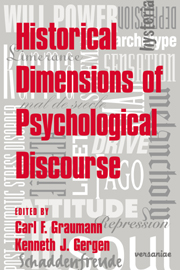Book contents
- Frontmatter
- Contents
- List of contributors
- 1 Psychological discourse in historical context: An introduction
- Part I Disciplining psychological discourse
- 2 The practice of psychological discourse
- 3 From tools to theories: Discovery in cognitive psychology
- 4 Metaphor and monophony in the twentieth-century psychology of emotions
- 5 Psyche and her descendants
- Part II History as culture critique
- Part III Early antecedents
- Part IV Lived history
- Author index
- Subject index
2 - The practice of psychological discourse
Published online by Cambridge University Press: 20 October 2009
- Frontmatter
- Contents
- List of contributors
- 1 Psychological discourse in historical context: An introduction
- Part I Disciplining psychological discourse
- 2 The practice of psychological discourse
- 3 From tools to theories: Discovery in cognitive psychology
- 4 Metaphor and monophony in the twentieth-century psychology of emotions
- 5 Psyche and her descendants
- Part II History as culture critique
- Part III Early antecedents
- Part IV Lived history
- Author index
- Subject index
Summary
For some time I have been trying to make sense of the history of psychological discourse. When I first began to occupy myself seriously with this task, I assumed, along with just about everyone else, that a historical account of psychological discourse would have to focus primarily on the concepts and theories that seemed to form the essential content of this discourse. Of course, I knew that, at least since the last quarter of the nineteenth century, psychologists had been quite busy doing other things than contributing to theoretical discourse. They had fervently embraced laboratory activity and become increasingly involved in an array of technologies for the production of psychological knowledge. But as experimental and other techniques supposedly related to theory as means to ends, they presumably played only a subsidiary role in the history of psychological discourse. Certainly, the traditional histories of the discipline, as much as they addressed themselves to theoretical problems, tended to treat the realm of methodology as relatively unproblematic, as being governed by self-evident principles of instrumental rationality and linear technical progress.
It soon became clear to me, however, that it was only possible to cling to this received view if one steadfastly closed one's eyes to a barrage of historical evidence. For example, the way in which the topics of psychological discourse were consistently redefined so as to fit the Procrustean bed of a very limited range of allowable procedures suggested that it was often the procedures that dictated theoretical formulations rather than the other way around.
- Type
- Chapter
- Information
- Historical Dimensions of Psychological Discourse , pp. 17 - 35Publisher: Cambridge University PressPrint publication year: 1996
- 9
- Cited by

